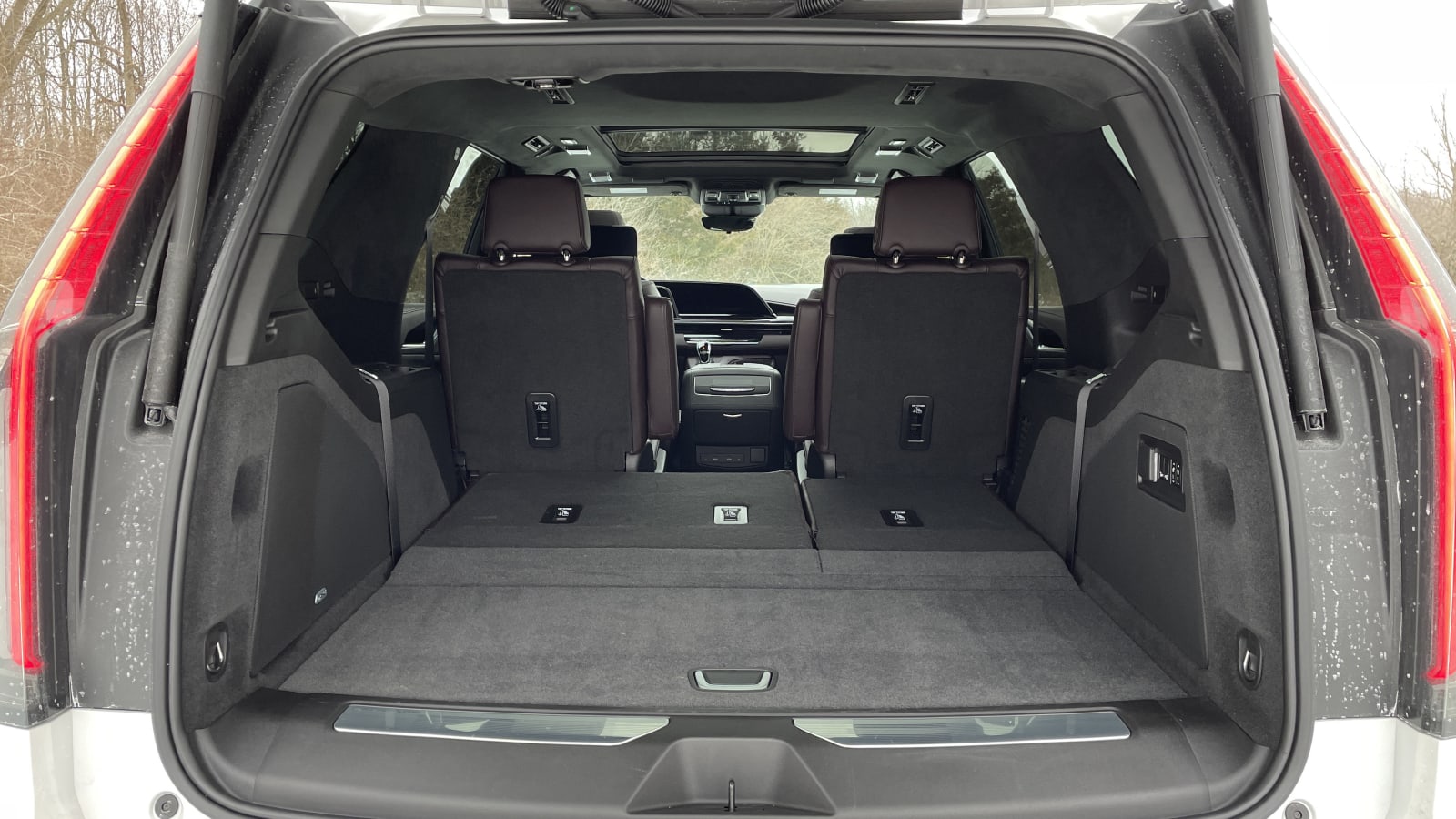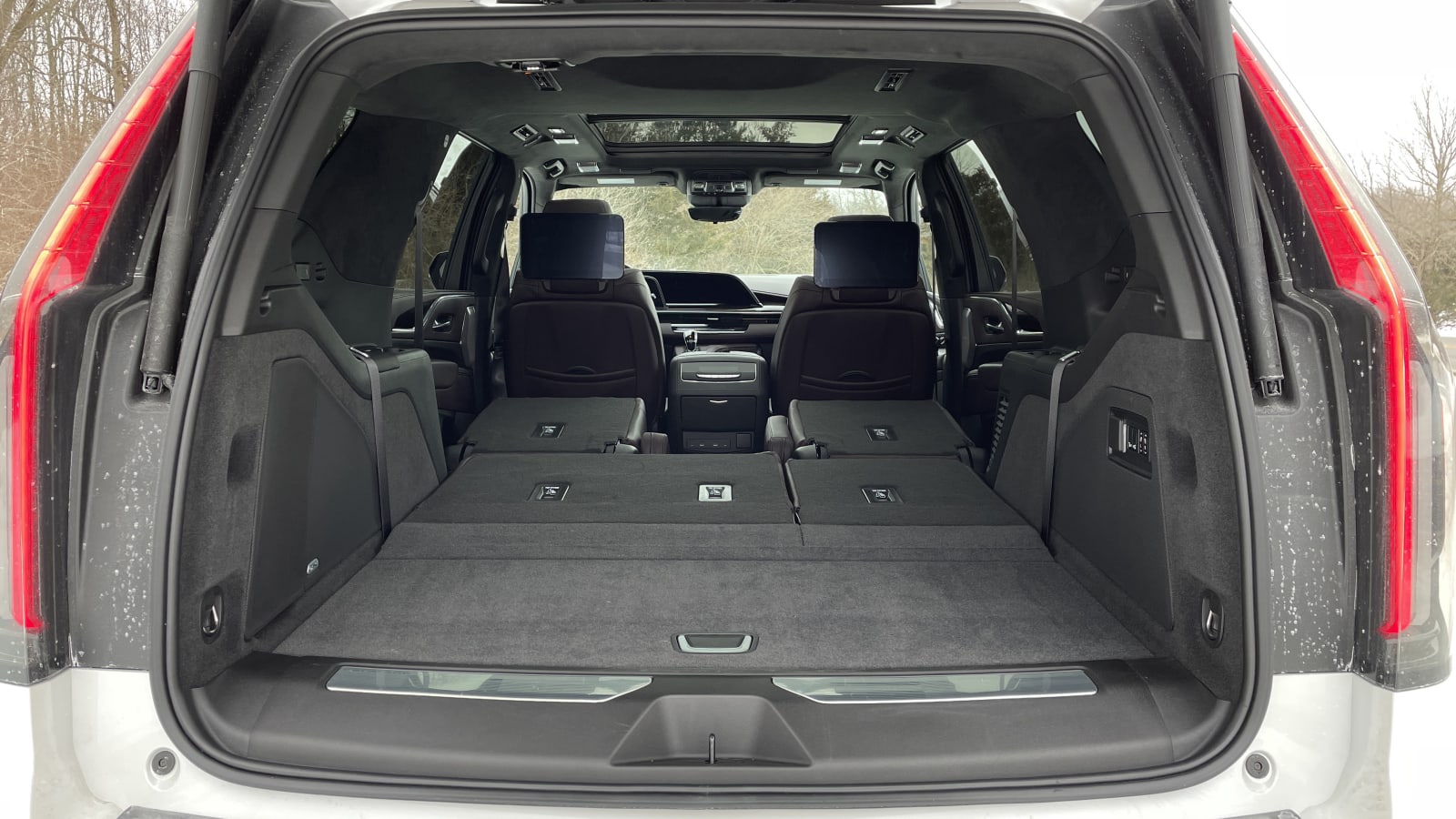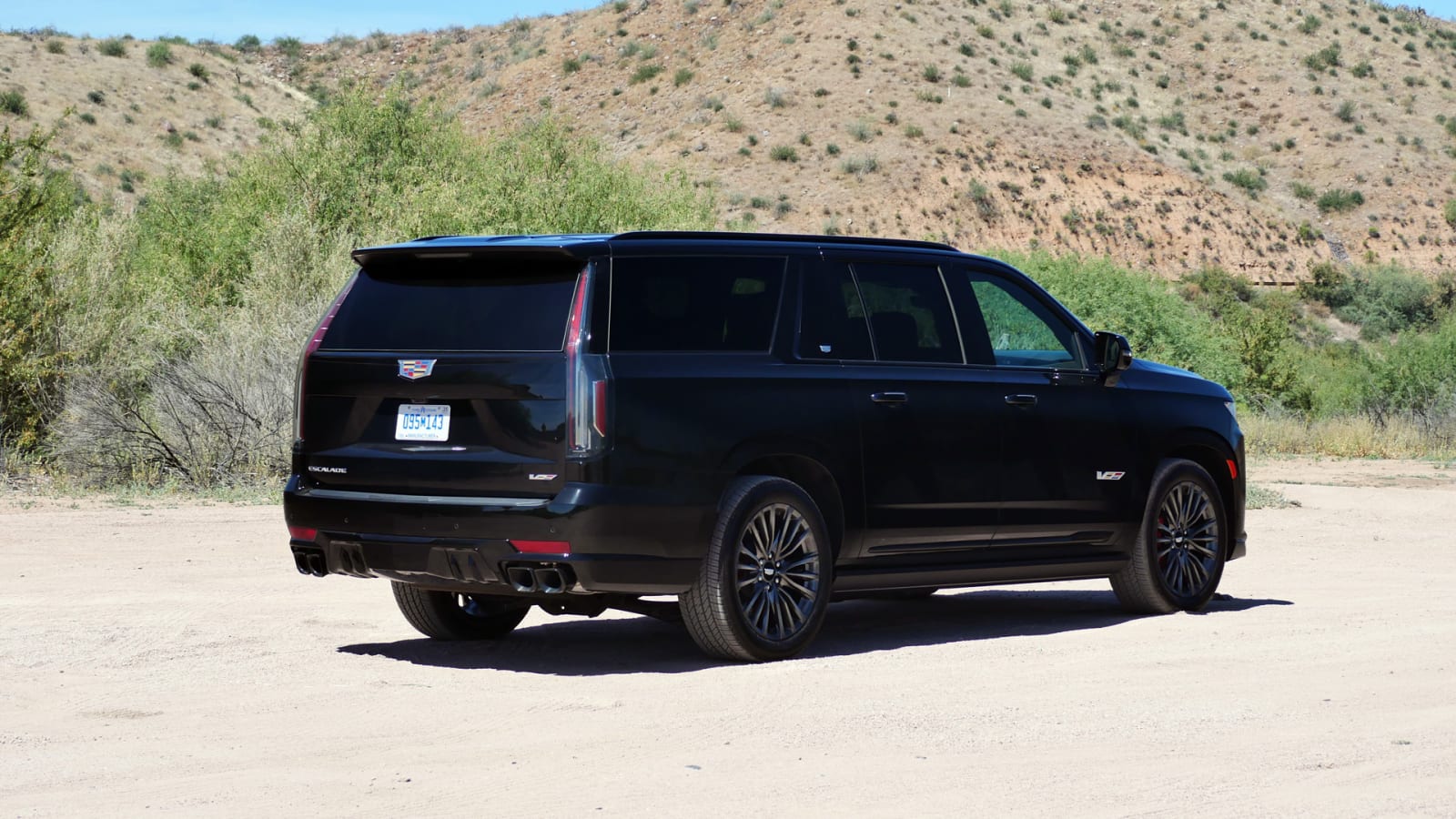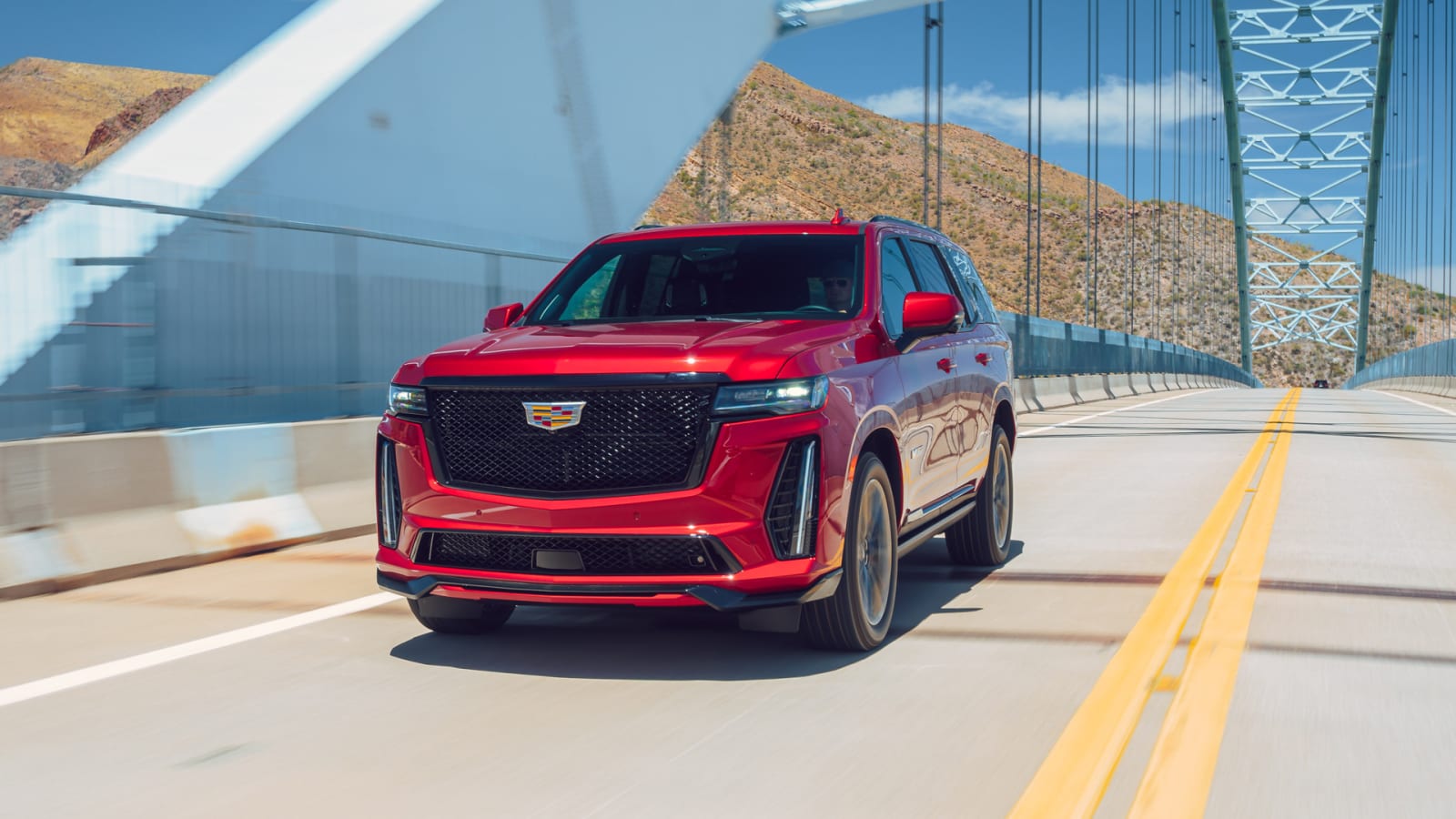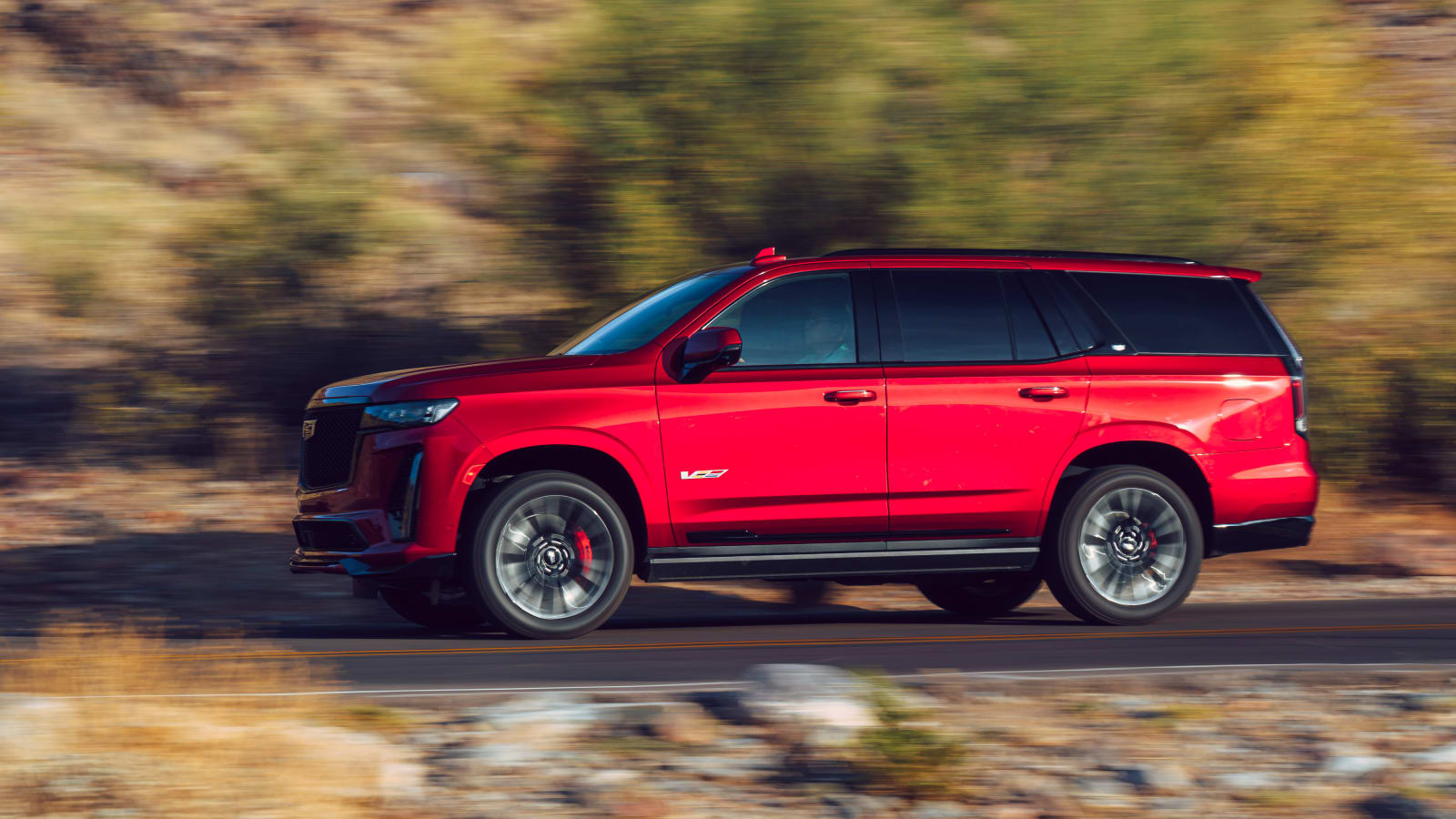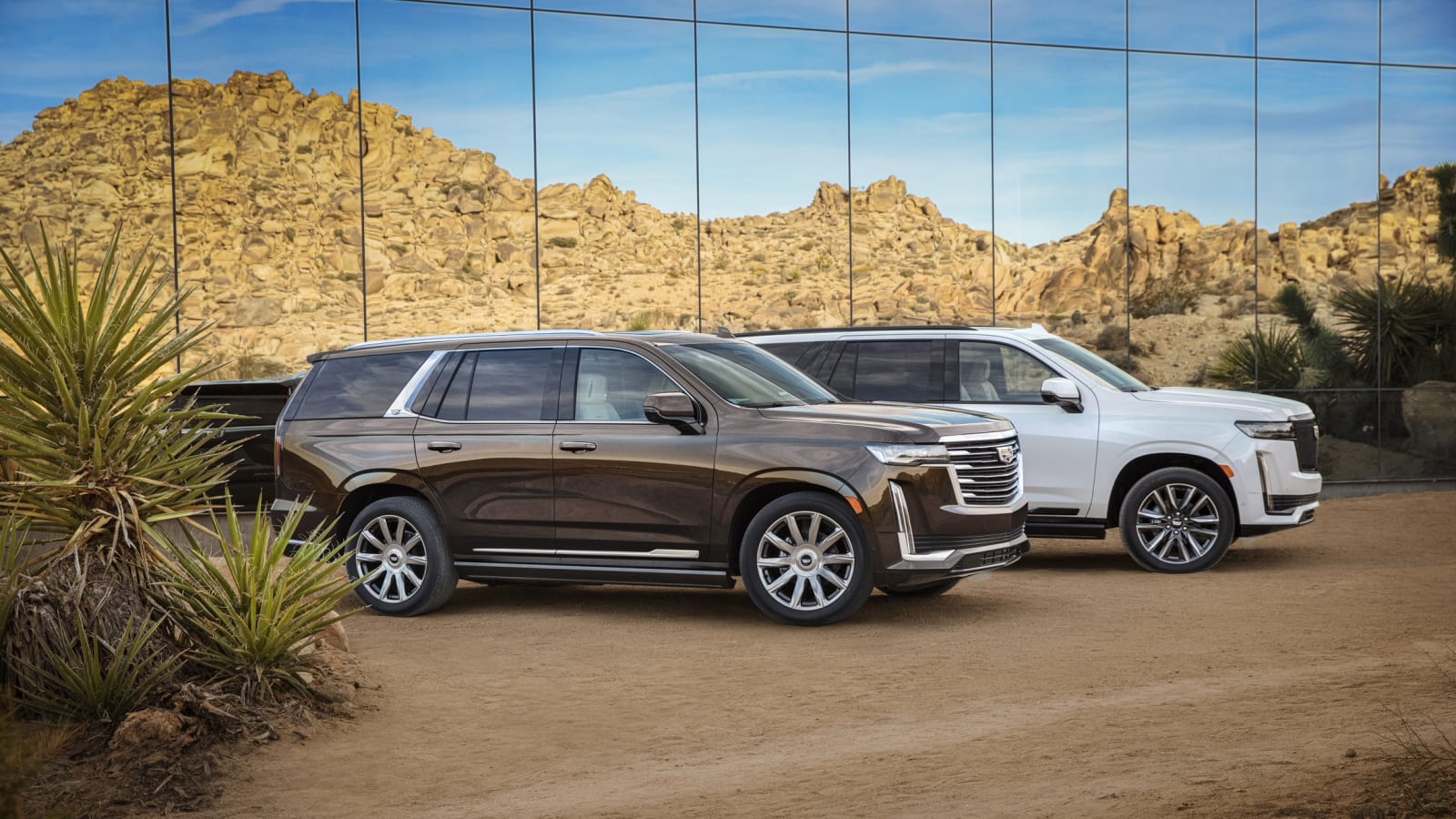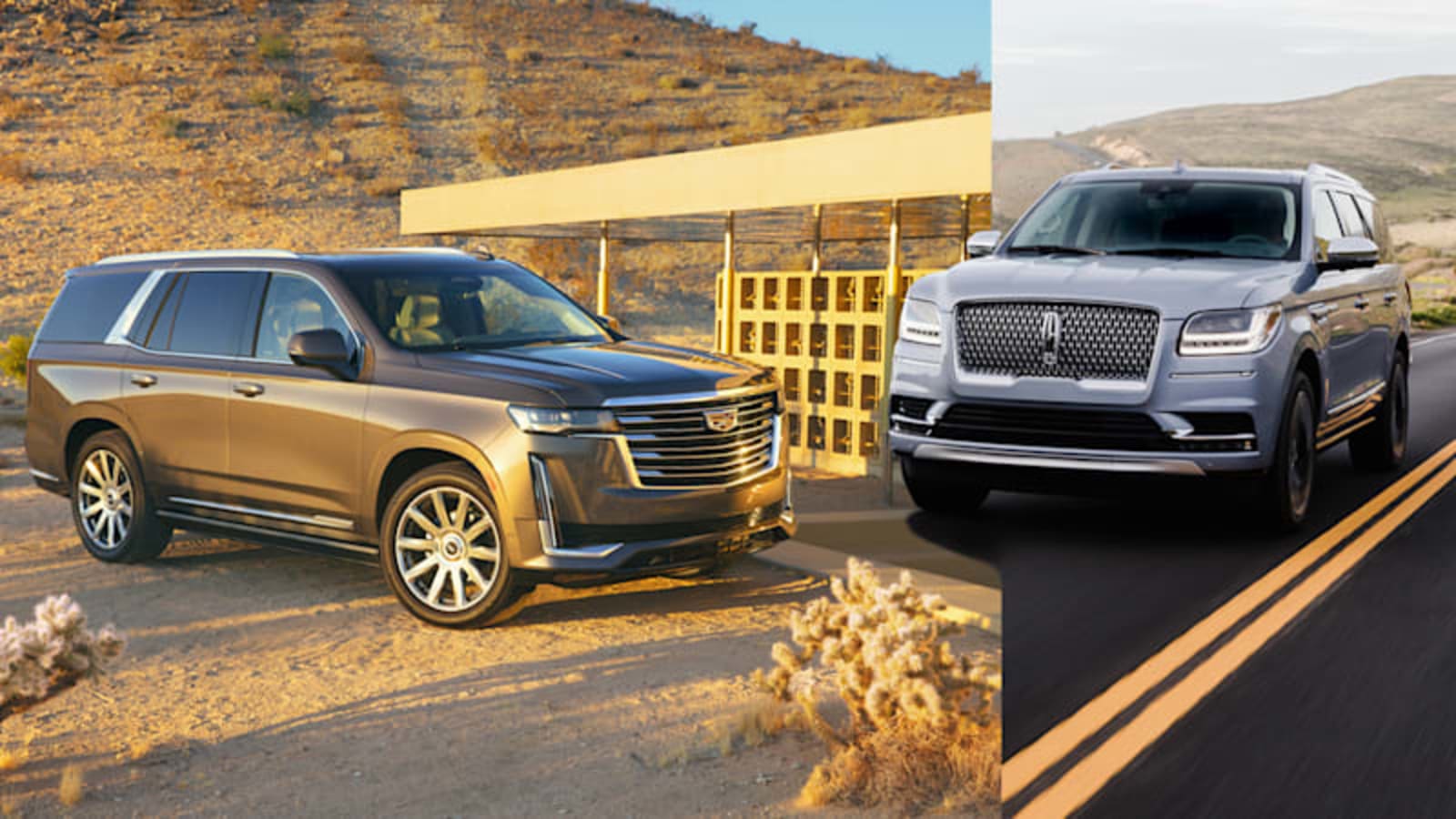2023 Cadillac Escalade Review | V for very big, very fast

The 2023 Cadillac Escalade is one of the best luxury SUVs you can buy. It covers every angle or use case you might be able to dream up. Cadillac treats it to a top-notch interior that doesn’t play second fiddle to its also-sumptuous competition. There’s an abundant amount of space in both the standard and cargo-extended Escalade ESV version. The ride is excellent when you pair its available air suspension with the magnetic ride dampers. And for 2023, you can even get a performance variant with the Escalade-V.
This segment of vehicle may be inherently inefficient, but the Escalade actually has a more efficient option with the Duramax diesel. It’s smooth and shockingly quiet, which is fitting for the Escalade’s personality. There’s no lack of tech on display inside the Escalade, as it features the triple OLED screens with an easy-to-use infotainment system. Plus, you can get it with the best hands-free driver assistance system out there, Super Cruise.
A Navigator may be more opulent with its distinctive interior options, and the German three-row SUVs provide a much different take on the idea of an ultra-luxury SUV, but as a total package, the Escalade is difficult to beat. The various trims, engine options and color combos make it possible to get a full-size luxury mobile in “Have It Your Way” fashion, even if that’s with a 668-horsepower supercharged V8.
Interior & Technology | Passenger & Cargo Space | Performance & Fuel Economy
What it’s like to drive | Pricing & Trim Levels | Crash Ratings & Safety Features
What’s new for 2023?
The big highlight for 2023 is the addition of the Escalade-V to the lineup. It gets a supercharged V8 engine with 682 horsepower and costs $149,990. This performance variant of the Escalade features a number of other changes to make it an extra-spicy family-mover that’ll get you from 0-60 mph in just 4.4 seconds and handle better than a standard Escalade.
Beyond the V, Cadillac made minor changes to the Escalade lineup. It added a digital owner’s manual to the infotainment system. Plus, three new colors are being introduced: Dark Emerald Metallic, Radiant Red Tintcoat and Argent Silver Metallic.
What are the Escalade’s interior and in-car technology like?
The Escalade doesn’t quite achieve the same elevated sense of fashion as Lincoln does with the Navigator, but it nevertheless makes a statement with its tech-forward take on luxury. The 38 inches of curved OLED screens we covered in our Escalade infotainment review dominate the dash in a brazen display of opulence. Large swaths of wood trim stretch across the dash horizontally and also adorn a substantial part of the center console. Your color and design options are plentiful, but it all depends on trim. The purple Dark Auburn is fantastic, and the light-and-airy Whisper Beige is another great option. Real wood trim in various colors and patterns can be had, and varying levels of leather and suede coverage are available. Even at its best, though, Lincoln’s Black Label interiors are still a cut above in terms of style and distinctive color options. An argument can also be made for the lovely new Jeep Grand Wagoneer interior.
There are three screens in total: a 16.9-inch touchscreen for the infotainment system, a 14.2-inch instrument cluster and a 7.2-inch touchscreen to the left of the cluster. All three are gorgeous OLED displays. It’s a new take on GM’s infotainment system as a whole, even separate from the Android Automotive-based infotainment in the Chevy and GMC full-size SUVs. Icons are big and easy to press. Nothing is hidden off-screen at any point. It just makes good sense. There are physical buttons and controls for things like the volume knob and frequently used apps like Navigation or Media. Plus, a scroll wheel on the center console provides a second method of navigating through it (Cadillac even designed a dedicated UI that it switches to when you use the wheel). Both wireless Apple CarPlay and wireless Android Auto come standard, too.
How big is the Escalade?
Huge. Like, it won’t fit in lots of normal garages huge, especially if you get the extended Escalade ESV that measures 226.9 inches in overall length. Prior to the introduction of the Jeep Wagoneer L, it was by far the longest of the full-size SUV class, and while it still bests the Jeep, it only does so by 0.2 inch. The concept of the ESV is the same as always. It’s the Suburban-ized Escalade, whereas the regular Escalade is equivalent to a Tahoe. Even the small one isn’t small, though. Like its Chevy and GMC siblings (not to mention the Navigator and literally every other competitor), the current Escalade generation has an independent rear suspension design, which substantially increases cargo capacity from its predecessor (10.3 cu-ft more with the third row up), lowers the lift-over height, and provides a considerably more spacious third row (a whopping 10.4 inches more than the previous generation). Third-row space isn’t quite as a good as a Navigator or Grand Wagoneer, but we’re talking varying degrees of surprisingly spacious. Full-size adults can actually fit quite comfortably back there.
The ESV doesn’t offer any extra seating space (a testament to the regular Escalade’s size increase), but it does greatly improve cargo capacity. Each configuration offers significantly more space than the non-ESV, with the most astounding difference being room behind the third row; it skyrockets from 25.5 cubes to 42.3 cubes. That puts the ESV into and above minivan territory. You can get an idea of how much cargo space the regular Escalade has behind its third row by checking out our Tahoe Luggage Test.
What are the Escalade’s fuel economy and performance specs?
The Escalade’s base engine is the 6.2-liter small-block V8 that serves as the upgrade for both the Tahoe and Yukon. It makes 420 horsepower and 460 pound-feet of torque, then channels that power through a 10-speed automatic transmission. Either rear-wheel-drive or four-wheel-drive versions are available. Fuel economy for the this engine was not available at the time of this writing, but for 2022, they topped out at 15 mpg city, 20 mpg highway and 17 mpg combined with rear-wheel drive. Opting for four-wheel drive drops each of those figures by one mpg to 14/19/16 mpg.
GM’s 3.0-liter turbo-diesel inline-six is also available. It pumps out a very diesel-like 277 horsepower and 460 pound-feet of torque to the 10-speed automatic. Fuel economy is hugely improved to 21 mpg city, 27 mpg highway and 23 mpg combined with rear-wheel drive. A similar 1 mpg hit in all categories is felt when you go with four-wheel drive. Diesel prices have skyrocketed in the past year, but the EPA estimates that you’re bound to save about $1,000 per year on fuel costs if you opt for the diesel. Plus, unlike the other full-size GM SUVs, the Escalade’s diesel engine is available as a no-cost option, making it even more appealing.
Finally, the Escalade-V features a hand-built 6.2-liter supercharged V8 that makes a massive 682 horsepower and 653 pound-feet of torque. It’s all routed through a 10-speed automatic transmission, and the V is the quickest Escalade with a 0-60 mph time of 4.4 seconds. Fuel economy for the V stands at 11 mpg city, 16 mpg highway and 13 mpg combined, which is as bad as it sounds. EPA estimates indicate it would cost you $1,200 more per year to fill up than standard 6.2-liter V8.
Fuel economy figures for the ESV are all identical to the standard-length Escalade.
What’s the Escalade like to drive?
The standard 6.2-liter V8 is a gem of an engine. It’s powerful and flexible, and the 10-speed makes great use of its strengths. Some of the V8’s bellow makes it into the cabin when you really step into the throttle, but it remains out of mind for the most part. It’s also not as smooth and effortless in its power delivery as the Navigator’s turbocharged V6 nor the upgrade engines of various high-end European SUVs. With that said, we think the best Escalade engine option is its unique offering: the Duramax diesel. A clackety diesel engine hardly sounds like a match for Cadillac’s flagship luxury SUV, but from the cabin, you wouldn’t even know that this Escalade is powered by diesel fuel. Actually, you can barely tell from the outside, either. This engine is refined, efficient, quiet and a perfect fit for a big, heavy SUV like the Escalade.
Ultimately, neither of the standard Escalade’s powertrain options are the highlight: that honor goes to the suspension. All but the base model Escalade can be equipped with Cadillac’s fourth-generation Magnetic Ride Control. Air suspension requires a Platinum model (be it the Sport or Premium Luxury versions; choose your own adventure). The combination of the two is exquisite, and it’s only over particularly bad pavement that the 22-inch wheels and body-on-frame construction combine to remind you that independent rear suspension alone is not a cure-all for the shortcomings of a truck chassis. We haven’t driven an Escalade without Magnetic Ride Control and the Air suspension, but there’s no doubt that the switch to an independent rear suspension quiets head toss and eliminates some of that truck feeling all on its own. For the time being, just know that the fully upgraded suspension rides like a dream and is astronomically better than the previous Escalade’s ride.
Finally, there’s the new 2023 Escalade-V that’s powered by a variation of Cadillac’s supercharged V8 from the CT5 Blackwing. The ignition bark is so loud, borderline startling and some would say absurd, that you’re bound to make enemies amongst neighbors and family members alike. It’s a much faster and louder Escalade, and is certainly more responsive to drive, but it’s still authentically an Escalade. The seemingly unavoidable body-on-frame jiggling is still present on various imperfect pavement types, meaning you do pay for its truck roots relative to a GLS or high-powered BMW X7. It also has launch control, of course. Select V mode, hold down the brake, apply the accelerator fully, wait for the traction control light to flash, and release the brake. Bam. The exhaust blares, your head snaps back and there’s suddenly a lot more sky in the windshield as the Escalade-V rather hilariously squats down at the rear as it launches toward the horizon. It’s more race boat than race car.
What other Cadillac Escalade reviews can I read?
2023 Cadillac Escalade-V First Drive Review: 682 horses, loud exhaust, $5 gas
Our first shot at the supercharged Escalade-V is one wild ride.
Cadillac Escalade Diesel Road Test Review | Winning us over
We see if GM’s Duramax diesel engine is a good fit for the Escalade
2021 Cadillac Escalade First Drive | Opulence at a cost
Everything you want to know about the engineering of the new Escalade and how it drives.
2021 Cadillac Escalade vs. 2020 Lincoln Navigator | How they compare on paper
Here’s how the Escalade measures up to its biggest competitor on paper: The Navigator.
How much is the 2023 Escalade’s price and what features are available?
Like Cadillac’s other offerings, the 2023 Escalade has a split trim hierarchy. Above the base Luxury model, you can choose one of two paths: Premium or Sport. The Premium Luxury and Premium Luxury Platinum are your more traditional, flashier options, with lots of chrome and a rich, warm interior. The Sport and Sport Platinum are for those who prefer a more modern, subtle aesthetic, with blackout exterior trim and more subdued interior finishes.
A base Luxury with rear-wheel drive will run you $77,490, including the $1,295 destination charge. Add $3,000 for four-wheel drive for both this and every other trim. Standard equipment includes 22-inch alloy wheels, auto-retracting assist steps, LED headlights and taillights, heated auto-dimming mirrors, power liftgate, auto wipers, leatherette upholstery (black only), heated front and rear seats, heated steering wheel, wireless phone charger, tri-zone climate control, interior ambient lighting, 19-speaker AKG audio system and the full triple OLED screen setup with wireless Apple CarPlay and wireless Android Auto.
You can find a full breakdown of the various trim levels plus specs and local pricing here at Autoblog. All of the base prices for each trim are listed below — just add $3,000 to each price to get the final with four-wheel drive (except for the V).
Luxury: $79,590
Premium Luxury: $88,390
Sport: $91,390
Premium Luxury Platinum: $105,890
Sport Platinum: $105,890
Escalade-V: $149,990
What are the Escalade’s safety ratings and driver assistance features?
The 2023 Escalade has a number of driver assistance and safety features as standard equipment. These include automatic emergency braking w/front pedestrian detection, forward collision and rear pedestrian warning, lane departure warning, lane-keeping assist, front and rear parking sensors, and a 360-degree camera.
There are a ton more safety features that are made standard when you step up one trim grade. The Premium Luxury adds an auto parallel/perpendicular parking system, blind-spot warning, rear cross-traffic alert, full-speed automatic emergency braking, reverse automatic braking, rear camera mirror and adaptive cruise control. All trim levels starting at the Premium Luxury Platinum and above also include trailer blind spot monitoring that extends the sensor’s reach to notify you of vehicles in the blind spot of the trailer you’re pulling. Super Cruise is an optional extra on all trim levels, and the same goes for Cadillac’s Night Vision technology.
Only the National Highway Traffic Safety Administration performed crash tests on the new Escalade so far. The government agency awarded it a four-star overall safety rating. It performed best in side crash tests (five-star ratings), but only received a three-star rollover rating and four-star front crash rating.
Related video:


